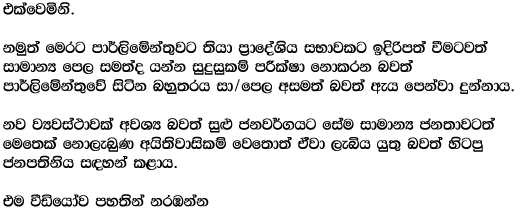
.
Former President
Chandrika Bandaranaike Kumaratunga says that Sri Lanka will be able to find a
“durable solution” to the religious and ethnic problems if the governments are
forced by the people to adopt and practice inclusivity.
Kumaratunga, who is
the Chairperson of the Office for National Unity and Reconciliation (ONUR), was
delivering a speech during the panel discussion on “Remembering Aluthgama 2014:
Equality, Social Justice and a new Constitutional Order” held today (27) at the
Bandaranaike Centre for International Study (BCIS), BMICH.
She said that
incidents such as Black July of 1983 or the Aluthgama incident or other attacks
on religious places of worship happen when the situation that is already
existing “suddenly bursts out and boils over.”
“But what we must not
forget it that it is there all the time. The slightest matchstick thrown at it
will set it on fire,” the former Sri Lankan President said.
“How do we resolve
this situation? How do we alleviate it? I can’t see a quick fix solution.”
She said that on one
hand Sri Lanka needs a new constitution guaranteeing those rights that have not
yet been given to the minorities and the citizens in general but on the other
hand as a society we need to accept the urgent need to reconcile, to build
bridges, to work and live in harmony and then work towards that.
She urged the people
never to forget that Sri Lankan society has produced from time to time
extremist organizations claiming to be Sinhala Buddhist organizations that have
created havoc in this country.
“But every single time
there has been a serious incident, the incumbent government has been behind
it,” she charged.
In other words our
society has not up to now given rise to organizations such as al-Qaida or
Taliban or ISIS or something like that, Kumaratunga said. We have little
organizations, minorities, small and not very powerful that come up from time
to time. “Every society has extremists.”
Every society has
minority extremists and if they go on and if the government ignores them, they
create a little trouble and that’s it, she said. “In Sri Lanka that has been
the case.”
“The only time they
have been powerful enough to create serious trouble is when the incumbent
government whichever it may be gave it support. I would say that is a positive
point.”
“So if governments are
forced by the people to adopt and practice inclusivity and doing all that is
required to build inclusive societies and nations I think then we will have a
durable solution to the religious ethnic problems Sri Lanka has experienced,”
she said.
.

